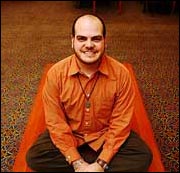New LGBT coordinator will emphasize trans issues
'It's time to give attention to the trans community,' says new UUA program coordinator Delfin Bautista.
Bautista, who identifies as transgender, started the job at the end of November. In the new position he will be responsible for the development of LGBT programs and resources and will also be engaged in advocacy efforts on issues such as “Don’t Ask, Don’t Tell,” marriage equality, and the Employment Non-Discrimination Act.
The LGBT Ministries program, which will be based at the UUA’s Washington, D.C., office, is part of the new Multicultural Growth and Witness program that was formed last May from the consolidation of the Identity-Based Ministries and Advocacy and Witness staff groups.
In addition to focusing attention on transgender-related issues, Bautista hopes to look at LGBT issues within the context of communities of color. “As a person of color myself, I know that these conversations aren’t really happening within the African American community, within the Hispanic community, within the Asian American community,” he said. “There really is a need for faithful voices to be part of the conversation so these issues can be talked about.”
Bautista graduated from Yale Divinity School in May 2010, where he served as student council president and as an intern in the Yale Chaplain’s office. After graduating he worked for the American Civil Liberties Union of Florida as advocacy coordinator for LGBT and Reproductive Rights before being tapped by the UUA.
He also has a Bachelor of Science in Social Work from Florida International University in Miami and a Master of Social Work from the University of Pennsylvania. Before going to divinity school, he worked as the intake coordinator for Our Kids of Miami-Dade/Monroe, helping children entering the welfare system.
While in divinity school Bautista did an internship at the Religious Institute in the summer of 2008 and was employed there for seven months in 2009–2010. The Religious Institute is a multifaith organization dedicated to exploring the relationship between faith and sexuality. It was co-founded by the Rev. Debra Haffner, a Unitarian Universalist community minister affiliated with the Unitarian Church of Westport, Ct.
Bautista participated in the 2007 Soulforce Equality Ride, traveling with other LGBT advocates in buses to colleges and universities with policies discriminatory to LGBT students to engage in conversations on faith and sexuality. He was arrested for civil disobedience at Notre Dame University in South Bend, Ind., and Bethany Lutheran College in Mankato, Minn.
“Delfin’s campaign and direct experience with Soulforce Equality Ride will serve him well as he works with our faith communities,” said Janice Marie Johnson, director of multicultural growth in the UUA’s Multicultural Growth and Witness staff group. “And his work with the Religious Institute, where he was part of their efforts to bridge sexuality, faith, and justice, will no doubt prove invaluable as we continue to build coalitions across faith communities.”
“He is committed to lesbian, gay, bisexual, and transgender issues,” said Johnson, “and to addressing them through an antiracism/antioppression/multiculturalism lens, and the rich diversity of his experiences bears that out.”
Born and raised in Miami, Bautista speaks fluent English and Spanish. His mother and stepfather both emigrated from Cuba.
He grew up Roman Catholic. “Most of my people consider themselves to be Catholic,” he said. “But I’ve usually been the rebel. I’ve always enjoyed having interfaith, ecumenical conversations and looking to other faith traditions for guidance. There’s beauty in Judaism, in Buddhism, in Islam. As I’ve grown older, I’ve really taken that to heart and have tried to embrace alternative approaches to theology and devotion.”
He said that he has been influenced by the ideas of Latin American theologians, like Gustavo Gutiérrez and Ada María Isasi-Díaz. “A lot of Latin American theology focuses on the idea of the border,” he said, “the idea that we have multiple identities that are sometimes in conflict with each other and sometimes complement each other. So we ourselves are walking borderlands, and we live in that tension every day. In my case, I’m Latino, queer, have immigrant parents, and was a divinity school student. Some of these identities are in harmony and sometimes not. It’s a place of theological development.”
Although not a Unitarian Universalist, Bautista is strongly considering joining a UU congregation. “I’m still in the process of discernment,” he says. “Perhaps God or the universe is trying to tell me, ‘Look, you’ve found your home.’”
See sidebar for links to related resources.
blog comments powered by Disqus







